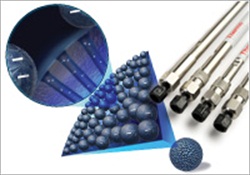Channels
Special Offers & Promotions
Thermo Fisher Scientific Introduces HPLC Column to Simplify and Improve Separations of Herbicides Diquat and Paraquat
Acclaim Trinity Q1 Column Designed to Eliminate Need for Ion Pairing Reagents, Exotic Mobile Phases
 Thermo Fisher Scientific Inc., the world leader in serving science, today introduced the Thermo Scientific Acclaim Trinity Q1 HPLC column, designed to facilitate high-resolution and high-throughput trace analysis of the herbicides diquat and paraquat in plants by liquid chromatography-mass spectrometery (LC-MS).
Thermo Fisher Scientific Inc., the world leader in serving science, today introduced the Thermo Scientific Acclaim Trinity Q1 HPLC column, designed to facilitate high-resolution and high-throughput trace analysis of the herbicides diquat and paraquat in plants by liquid chromatography-mass spectrometery (LC-MS).According to the U.S. Environmental Protection Agency Healthcare Handbook, diquat and paraquat are non-selective herbicides that are widely-used in agriculture and by government agencies and industries for control of weeds. Both are considered to be toxic, and a recent study suggested a linkage between paraquat and Parkinson’s Disease among farm workers[1]. While the dangers of the pesticides, when concentrated, are well documented, the effects of residual levels of these pesticides in food require additional research.
AcclaimTM TrinityTM Q1 columns have demonstrated the ability to deliver the retention, resolution, peak shape and speed needed to improve diquat and paraquat LC-MS analysis in common terrestrial and aquatic plant matrices. The stable baseline separation for diquat and paraquat reduces the challenges of achieving accurate detection and quantitation compared to reversed-phase column methods.
The new column contains innovative Nanopolymer Silica Hybrid (NSH) technology that, unlike other support systems, does not require ion pair reagents or exotic mobile phases to separate diquat and paraquat for LC-MS analysis. The cation-exchange function provides retention and separation for diquat and paraquat while the anion-exchange moiety effectively deactivates the undesirable interaction between the surface silanols and the analytes.
For more information about the new Acclaim Trinity Q1 HPLC column for diquat and paraquat, click here
About Thermo Fisher Scientific
Thermo Fisher Scientific Inc. is the world leader in serving science. Our mission is to enable our customers to make the world healthier, cleaner and safer. With revenues of $12 billion, we have approximately 39,000 employees and serve customers within pharmaceutical and biotech companies, hospitals and clinical diagnostic labs, universities, research institutions and government agencies, as well as in environmental and process control industries. We create value for our key stakeholders through three premier brands, Thermo Scientific, Fisher Scientific and Unity™ Lab Services, which offer a unique combination of innovative technologies, convenient purchasing options and a single solution for laboratory operations management. Our products and services help our customers solve complex analytical challenges, improve patient diagnostics and increase laboratory productivity.[1] Tanner, Caroline M.; Freya Kamel, G. Webster Ross, Jane A. Hoppin, Samuel M. Goldman, Monica Korell, Connie Marras, Grace S. Bhudhikanok, Meike Kasten, Anabel R. Chade, Kathleen Comyns, Marie Barber Richards, Cheryl Meng, Benjamin Priestley, Hubert H. Fernandez, Franca Cambi, David M. Umbach, Aaron Blair, Dale P. Sandler, J. William Langston (2011). "Rotenone, Paraquat and Parkinson’s Disease".Environmental Health Perspectives 119 (6): 866–72.doi:10.1289/ehp.1002839. ISSN 0091-6765. PMC 3114824.PMID 21269927. Retrieved 2011-02-14.
Media Partners


